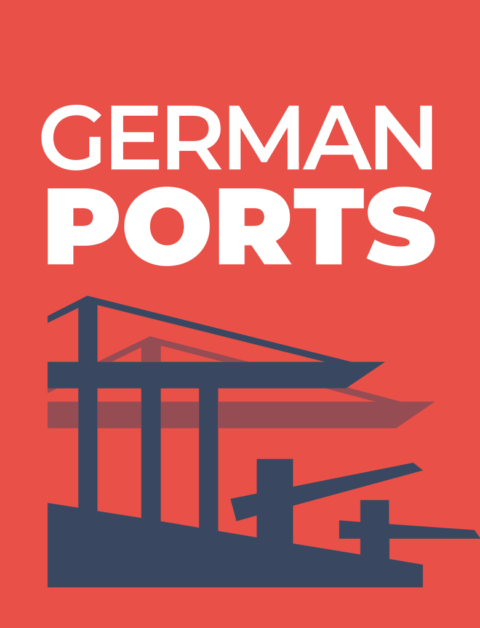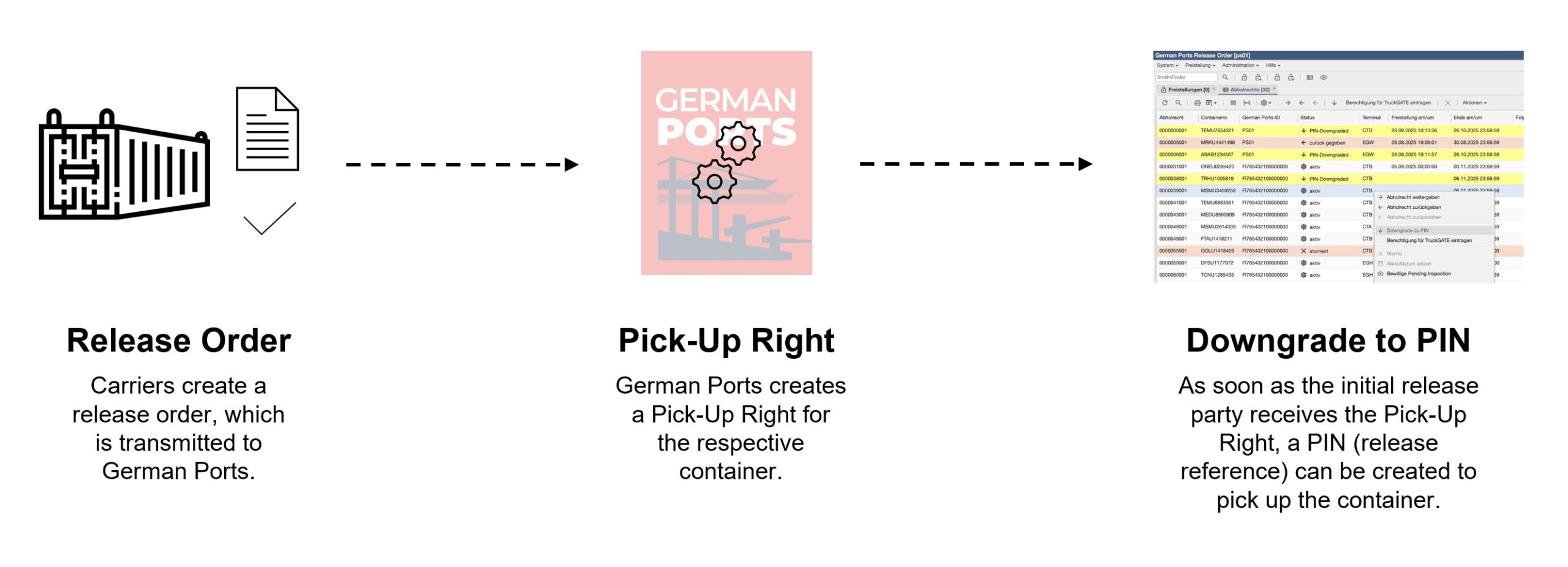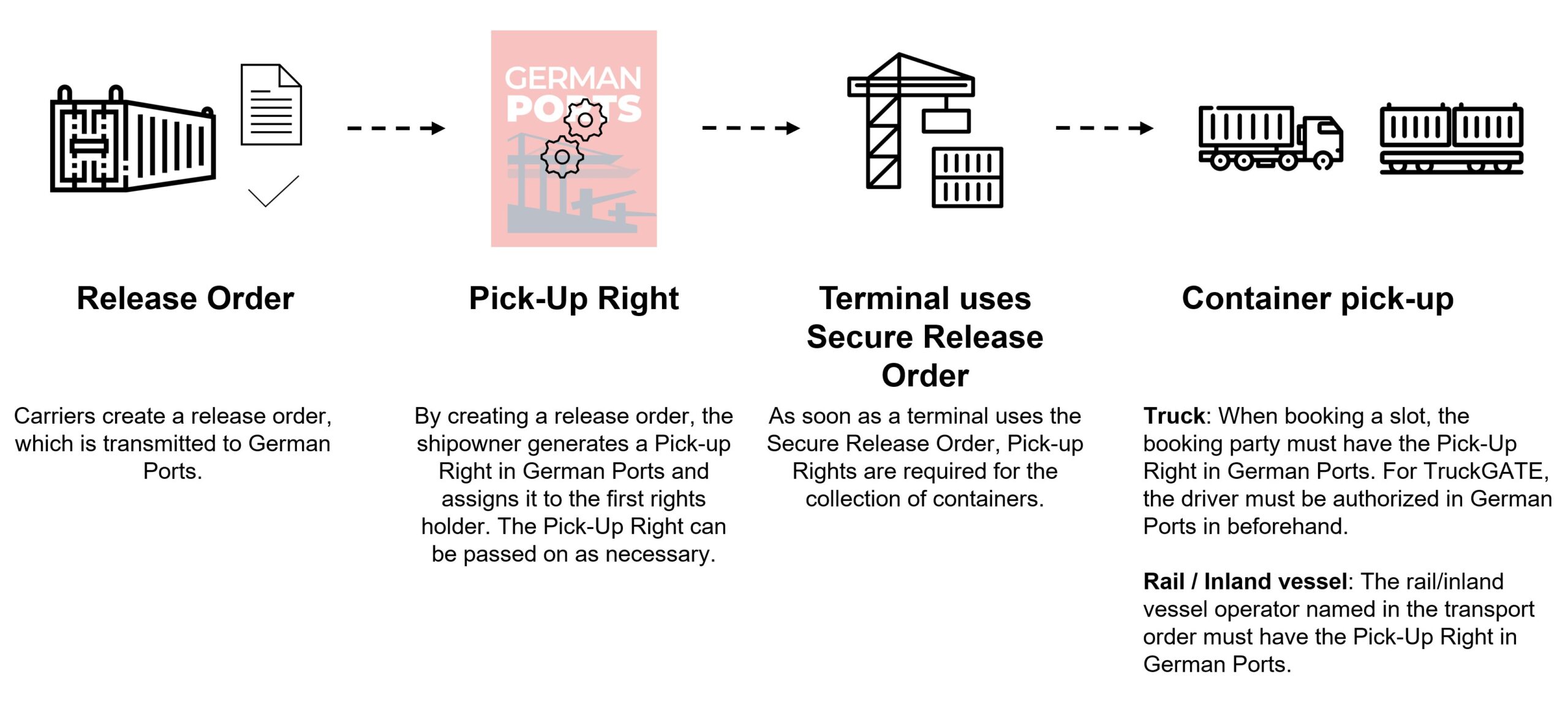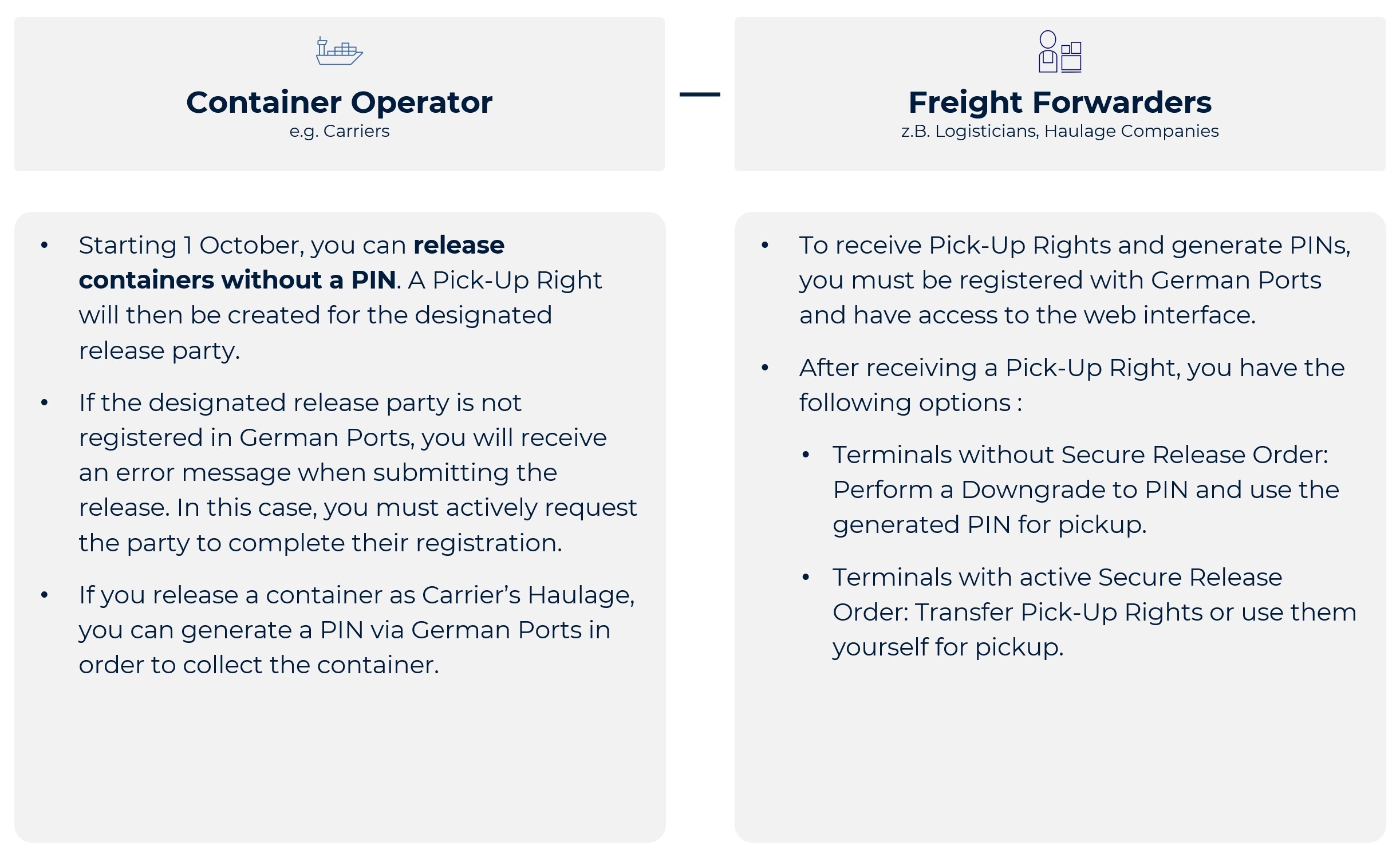More security
through digitalisation
in our harbours
With the German Ports Secure Release Order, the collection processes are
of the German seaports digitised, standardised and secured.
German Ports Secure Release Order
German Ports: Our vision
German Ports is shaping a secure, transparent and digital future for container handling in German seaports. With a standardised digital approval process, we create transparency, increase security and create a reliable basis for future-proof port logistics.

Live info
Since 1 October, shipowners have been creating their collection rights directly in German Ports. As an Initial Release Party (IRP), you must be registered and set up in German Ports in order to receive these pick-up authorisations. As long as the terminals are not yet live in German Ports, a PIN must also be generated via the web interface, which is used for container collection.

Status updates
Maintenance window:
Live system:
Daily: 7:30 a.m. – 8:00 a.m.
Customer test system:
daily: 07:30-8:00, 12-12:30, 16-16:30
Planned Go Live dates
Go Live Planning Reeder

All shipowners have successfully gone live.
Go Live Planning Terminals
04.11.2025 HHLA CTT
24.11.2025 EG CTH
25.11.2025 NTB
08.12.2025 EG CTB
14.01.2026 HHLA CTB
02.02.2026 EG CTW
03/2026 HHLA CTA
Launch of Secure Release Order
On 1 October 2025, the Secure Release Order process will be launched with the shipowners. For all other process participants, a "downgrade to PIN" will remain possible for a transitional period so that the PIN-based process can continue to be used.
From 4 November, the terminals in Hamburg, Bremerhaven and Wilhelmshaven will gradually switch to the Secure Release Order. The digital pick-up authorisation will then be required for container pick-up.
Roles and involved parties
FAQ German Ports
The introduction will not be postponed, but will take place in stages. The German Ports platform is available from 01 October. The actual utilisation is carried out by the shipowners from 01 October to 03 November at the latest, as soon as a sufficient number of initial shipowners are available for the respective shipowner. Release Parties is connected.
German seaports are part of the critical infrastructure and therefore require a particularly reliable and secure approach when introducing new processes. In order to meet this requirement, the Secure Release Order (SRO) will be introduced on 1 October 2025 in a stable and gradual onboarding process. The aim is to enable a secure transition for everyone involved and at the same time to strengthen the resilience of the import processes in the long term.
In order to minimise possible implementation risks, the changeover is being carried out in stages.
The primary goal is to both develop the German Ports, as well as stabilising the associated processes of all those involved and using this time for active onboarding. During this time, tests are therefore carried out, both technically and professionally, as well as further coordination rounds. Please note the areas Latest news and Events.
In order to minimise possible implementation risks, the changeover is being carried out in stages.
Shipowners will announce the launch date with their Initial Release Party (IRP)i.e. as a rule Haulage companies, who receive the right of exemption and coordinate this accordingly. with the respective customers communicate. It is therefore important to remain in close dialogue during this phase.
Haulage companies that are not yet connected can during the Onboarding phase (01 October to 02 November 2025) via "Downgrade to PIN" receive a PIN from the IRP and therefore do not yet need to be connected in October.
This may indeed be the case. For shipowners, who are already working productively with the portal, the exemption is then granted by "Downgrade to PIN", for shipowners, who have not yet changed over by PIN.
Individual terminals will begin to check the digital collection right on 3 November. According to the current status, further terminals will follow 2 weeks later. An exact plan of when which terminal will start, is currently being harmonised and shortly here on the portal announced.
2 admin users can be set up per client.
Admin users can only be changed via Support. Please create the user you want to use as an admin yourself. Then please let Support know which user you want to use as an admin. If you already have two admin users, please also let us know which user's admin rights are to be withdrawn.
German Ports is pursuing the goal of making the collection process for import containers in the German seaports of Bremerhaven, Hamburg and Wilhelmshaven more secure. A standardised, digital collection process is to replace the current exemption PIN with a pin-free, digital collection authorisation. A standardised process that is not only used at all locations, but also by all economic operators in the supply chain, should also strengthen the attractiveness of German seaports in international competition.
Commissioning will begin on 1 October 2025 and will take place in stages.
A basic monthly fee of € 60.00 per contractual partner (DAKOSY for Hamburg, dbh for Bremerhaven and Wilhelmshaven) is charged for the use of German Ports. In addition, the following costs are charged on a case-by-case basis:
- Creation of a collection right: € 0.80 per creation
- Activation of a pick-up right: € 0.80 per activation
- Forwarding a pick-up right: € 0.40 per forwarding
- Requesting a collection right: € 0.39 per exempted container
Further information can be found here: Prices - German Ports
To be able to use the new digital exemption procedure, companies can first register at Registration for participation in German Ports - German Ports register. They will then receive the contract documents. As soon as DAKOSY or dbh logistics IT receives these signed documents, the technical connection and activation on the web platforms (German Ports, IMP, BIT) can take place.
Firstly, you need to register your company in German Ports via Registration - German Ports - Borderless harbour flow register. Your designated administrators can then set up various branches and user accounts on the platform. Further information can be found in the associated User guide.
We are currently receiving a large number of registrations, which we are processing one after the other as quickly as possible. We therefore ask for your patience. You will receive your contract documents in the next few days and the corresponding access data to German Ports after signing the contract.
Once you have successfully registered and signed the contract, you can be connected to the test system. Please get in touch with us, for example via our contact form on our website: Contact - German Ports - Borderless harbour flow
You can use German Ports both via an interface and via the web application. Please specify which form of connection you require when registering.
Whether the consignee must be registered with German Ports as the rights holder depends on how the cooperation between consignee and forwarder is contractually regulated - in particular, who is to assume the right of indemnity according to the assignment agreement.
In practice, there are usually two options:
- The consignee manages the exemption himself. In this case, the consignee receives the right of collection directly via German Ports and only instructs the freight forwarder to collect the goods. Consequence: The consignee must be registered and can then pass on the collection right to the freight forwarder.
- The freight forwarder assumes the indemnity in his own name. In this case, the right of indemnity is transferred from the consignee to the freight forwarder by means of an assignment agreement, so that the freight forwarder manages the indemnity independently. Consequence: In this case, the freight forwarder must be registered.
To summarise: Those who have to register are not from the system specifications of German Ports, but depends on the contractual distribution of roles between consignee and forwarder. The decisive factor is who should ultimately receive and manage the collection right.
German Ports itself does not manage any assignment agreements and is not involved in any contractual constellations. The platform serves exclusively to provide collection rights and to enable their transfer.
The system is secured across several levels - including through proven cloud and Azure mechanisms such as redundancy, regular backups with recovery options, continuous monitoring and rapid response in the event of a fault.
In the event of a system failure (German Ports/TR02/IDP systems), no documentation of the deliveries needs to be added.
The time of system outages is shown in German Ports for the users of the authorities.
Legacy codes are your user codes in the respective in-house systems of dbh and/or DAKOSY for the CODIS or TR02 applications. They are used when you carry out the rights check against German Ports via the in-house systems. IMPORTANT: If you are not registered in TR02 or CODIS and therefore not a user of these systems, you do not have any legacy codes! Accordingly, ignore this entry. How the registration works is explained in our tutorials.
Partner codes are the identification numbers under which you are listed as a customer of the shipping company. To do this, you need to liaise with your shipowners! If a shipping company assigns collection rights via the partner codes, you must ask the shipping company for your partner code and link it to your German Ports ID accordingly. How the registration works is explained in our tutorials.
Whether you have to enter partner codes in German Ports depends on the specifications of the respective carrier. If your carrier works with partner codes in German Ports, these must be entered in German Ports. If your carrier does not use partner codes and uses German Ports IDs instead, you do not need to enter any partner codes. Please always follow the communication and specifications of your respective carrier.
You will receive further information from our webinars here. User-specific information, documentation & guides can also be found on the German Ports website under the menu item Roles to view. We will also be providing video tutorials in the coming weeks explaining how to use the application.
For further questions please use our Contact form for the port in question or call us on +49 421 30902810 for Bremerhaven & Wilhelmshaven or +49 40 37860970 for Hamburg.
News and events
Box release revolution
20 November 2025 | Following diverse problems associated with container release a new standard is under development with associated new technology being rolled out... Read more here Source: PORTSTRATEGY
Free webinar -
German Ports (in German language)
| 19 November 2025 13:30-14:30
We invite all freight forwarders, logisticians, haulage companies and RUs/rail operators involved in collection processes at German seaports to a free webinar on 19 November 2025 from 13:30 - 14:30 to provide information on the status of the introduction of the German Ports Secure Release Order. In addition, practical tips on operational [...]
Play it safe
10 October 2025 | The digital release procedure for import containers via the German seaports was launched on 1 October. The introduction of the "Secure Release Order" is intended to mark significant progress in the digital handling of import processes. Ports are the gateways to the world. They form interfaces between land and sea transport and [...]
Seaports: Digital exemption procedure for import containers starts in stages
06 October 2025 | The new digital release procedure for import containers was successfully introduced in the seaports of Bremerhaven, Wilhelmshaven and Hamburg on 1 October with the "Secure Release Order" (SRO), as reported in a press release. The launch marks the start of the project, particularly for the safety of employees in the seaports and in the [...]
Secure Release Order successfully launched
Gradual rollout of German Ports begins 06 October 2025 | The German port industry took a significant step towards digitalisation on 1 October 2025: The new digital release procedure for import containers was successfully introduced in the seaports of Bremerhaven, Wilhelmshaven and Hamburg with the Secure Release Order (SRO). With the start [...]
Import clearance: Digital exemption procedure at German seaports
01 October 2025 | On 1 October 2025, a new procedure for the digital release of import containers will be introduced in the German seaports of Hamburg, Bremerhaven and Wilhelmshaven: Secure Release Order (SRO). It is set to replace the previous PIN-based procedure. From this point on, shipping companies will be able to release their containers PIN-free and [...]



